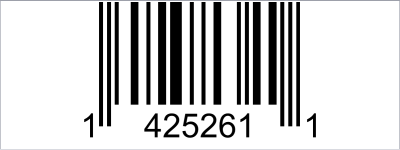UPC-E1
- 2 minutes to read
Short Description
UPC-E is a kind of UPC-A, which allows a more compact barcode by eliminating “extra” zeros. Since the resulting UPC-E barcode is about half the size of the UPC-A barcode, UPC-E is generally used on products with a very small packaging where a full UPC-A barcode doesn’t fit.
The UPC-E1 is a variation of UPC-E code with the number system set to “1”. In the human readable string of the bar code the first digit signifies the number system (always 1 for this code type), the last digit is the check digit of the original UPC-A code. So, in the example below, the original UPC-A code is “14210000526”. We should remove the leading “1” when assigning the string to the control’s property, since the code format itself implies its presence. The checksum digit (1) is calculated automatically, and the symbology algorithm transforms the rest of the numeral string. The result is 425261, and it is encoded along with the number system prefix and the check digit into the scanner-readable form.
Not every UPC-A code can be transformed into the UPC-E1. Refer to the following article for more information: Universal Product Code.

Since the number system “1” is not used in regular UPC-A codes, the UPC-E1 symbology use is uncommon.